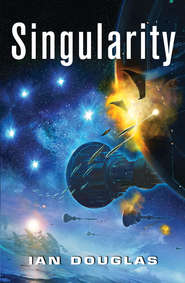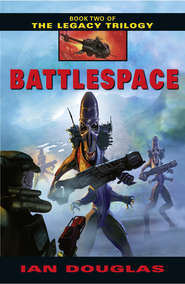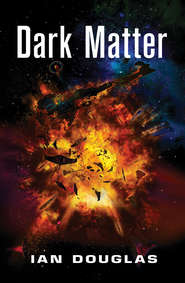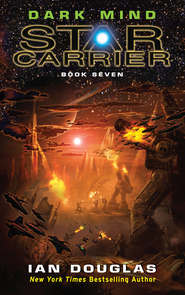По всем вопросам обращайтесь на: info@litportal.ru
(©) 2003-2024.
✖
The Star Carrier Series Books 1-3: Earth Strike, Centre of Gravity, Singularity
Настройки чтения
Размер шрифта
Высота строк
Поля
“Right. My mistake.” He felt clumsy. He knew that aliens were never easily categorized. But faced with the truly alien, the human mind always sought points of similarity, easy starting places, something recognizable.
“At this point,” Wilkerson pointed out, “we’re not even sure about whether to call these things animal, vegetable, or mineral. They’re carbon-based, we know, but they appear to manufacture at least part of their metabolic energy with a chlorophyll analogue in the skin pigmentation. Dr. George figured that much out from skin samples she took on Haris.”
Koenig looked at the young woman with new respect. “You actually went in and got a skin sample from one of those things?”
“We used robots, Admiral,” she replied. “Still, they seemed pretty passive. They might have known we were simply trying to find out about their physical needs.”
Koenig nodded. He wondered what his reaction would have been if he’d been captured by a pack of these slimy, tentacled slugs, and they—or their machines—had come after him with a sampling probe or scalpel.
How intelligent were they, really?
“Their biochemistries appear to be driven by both carbon and silicon,” Wilkerson continued. “They also use a lot of sulfur chemistry.”
“What kind of environment?” Koenig asked.
“Hot,” Wilkerson replied. “We think their homeworld is a less-extreme version of Venus. Carbon dioxide atmosphere with traces of sulfur, sulfur dioxide, water vapor, and droplets of sulfuric acid. Temperature in the one-hundred-degree Celsius range. Not our kind of place at all.”
“Sounds like Eta Boötis Four,” Koenig said, thoughtful. He was wondering if the Turusch had attacked the place not because they were working for the Sh’daar, but because they wanted the place for themselves.
“Only superficially,” Wilkerson said. “Eta Boötis is colder, has less CO
, more sulfur compounds, a lot more oxygen and ammonia, and not as much carbonyl sulfide. We think the Turusch homeworld has a much lower surface gravity, too—less than one G.”
Koenig scowled. “Then we’re back to square one in understanding why they attacked us.”
“They appear to be the right-hand … ah … right-tentacle representatives of the Sh’daar,” Brandt said. “I thought that was understood from the beginning.”
“So far as these things are concerned, nothing is understood,” Koenig said. “Remember, we’ve never even seen a Sh’daar … and this is our very first look at the Turusch. For all we know, the Sh’daar could just be some sort of Turusch ruling caste, and not a different species at all.”
“Go ahead and ask them,” Wilkerson suggested.
“How?”
“The language software is running. Just use this to access it.” Wilkerson passed a mental icon to Koenig. He mindclicked it. “Who are you?” he asked, deciding to stick with the basics, at least to begin.
Two alien heads whipped around, facing the white robotic sphere. Damn … these things might look like giant slugs, but they were quick. Koenig could hear a kind of humming or buzzing as the robot spoke. A moment later, the aliens answered with the same pulsing buzz … but they answered together, and the audio translation came out unintelligible as two computer-generated voices spoke at the same time.
Fortunately, a text version of both replies printed itself out in a side window in his in-head display.
“This one was Falling Droplet, of the Third Hierarchy,” one said, while the other replied, “Speak we now with the Mind Here or the Mind Below?”
Koenig read the answers, and blinked, puzzled. “I don’t understand,” he said without using the translation software. He was addressing the other humans.
“Don’t feel bad, sir,” Wilkerson said. “No matter how clear your question, the answer always feels fuzzy … like you’re missing something.”
“Can we separate them? Question them singly?”
“We tried that on Haris, Admiral,” George said. “They went into a mope, and appeared to be wasting away. And they wouldn’t answer anything. Our working theory is that they have some kind of gestalt going, a hive mind, maybe. If they’re alone, they don’t function as well. They might even die. Like worker ants.”
“I … see.” This was getting more and more complicated. He mindclicked the translate icon again. “Why do you work for the Sh’daar?”
“The Sh’daar reject your transcendence and accept you if it is only you,” one said, while the other said, “The Seed encompasses and arises from the Mind Below. How would it be otherwise?”
“What do you mean, they reject our transcendence? What is that?”
“Your species approaches the point of transcendence,” one said.
“Transcendence is the ultimate evil that has been banished,” said the other.
This was going nowhere. “Are your needs being looked after?” he asked them. “Are your nutritional needs being met?”
“We require the Seed,” said one. “We are the Seed,” said the other.
“Not exactly helpful, are they?” Koenig asked the others.
“Actually, they seem to be very cooperative,” George told him. “We just don’t have enough background yet to make sense of their answers.”
“They mentioned something … what? Mind Below?”
“Mind Here, Mind Below,” Brandt said. “We’ve also heard them reference something called ‘Mind Above.’”
“Might that be like the human subconscious?”
“Since we’re not even sure we can define what the human subconscious is,” Wilkerson told him, “I’d say it’s a bit early to speculate about that.”
“Point.”
Both of the Turusch were thrashing about now, and he heard the buzzing once again. This time, he could understand the computer-generated audio, because the two were in perfect synch. “Threat!” they said in unison. “Kill!”
Abruptly, shockingly, the heads of both Turusch split open, the tripartite armored covering separating in thirds and yawning wide. Instead of a mouth or teeth, however, Koenig saw that the openings were blocked with dark-pink tissue, glistening and moist. Something like a slender harpoon, black and a meter long, was stabbing out from the center of the tissue mass, however, together with a shorter but wider fleshy tube growing from beside the harpoon’s base.
If it was a mouth, it was like no mouth Koenig had ever seen or heard of.
The humans withdrew into the virtual recreation of the outer research lab, not because they were in danger—the NTE robots were pretty much invulnerable—but because conversation had become impossible.
“So that’s the enemy, eh?” Koenig said, shaking his head. “How’d we get them?”
“We recovered one of their Toad fighters,” George explained. “It crashed near the perimeter, and we sent a SAR and a weapons squad out to pick it up.”
“So you don’t think they were trying to surrender deliberately … or infiltrate our lines, or anything like that.”
“No, sir,” George told him. “It certainly didn’t look deliberate, anyway. General Gorman was wondering the same thing. He was wondering if they were berserkers. Suicide troops.”
Until their psychology was better understood, every move the two made, everything they said, was going to be the subject of long and careful analyses.
“My orders,” Koenig told them, “are to get them both to Port Phobos. The xeno department there will want full reports from all of you.”
“Yes, sir.”











